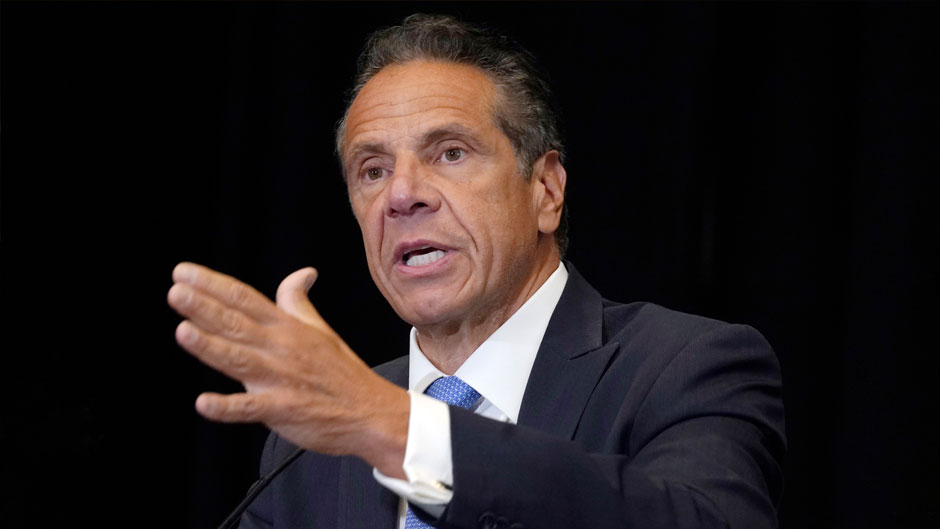Call it his two weeks’ notice.
Facing impeachment and the brunt of a scathing 165-page report that found he sexually harassed 11 women, New York Gov. Andrew Cuomo announced Tuesday that he would resign in 14 days, saying that he did not want to distract from the work of state government.
“Given the circumstances, the best way I can help now is to step aside and let government get back to governing,” Cuomo said.
Lt. Gov. Kathy Hochul will replace him, becoming New York’s first female governor.
In his resignation speech, Cuomo blamed “generational and cultural shifts” for the sexual harassment allegations against him. Was his comment self-serving?
“Workplace sexual harassment laws have been in effect since Title VII of the Civil Rights Act of 1964 made it illegal for employers to allow anyone to be sexually harassed at work,” said Claire Oueslati-Porter, interim director of the Gender and Sexuality Studies Program in the University of Miami College of Arts and Sciences.
“Cuomo has championed sexual harassment legislation throughout his political career,” she added. “He seems to waver between an ongoing attempt to blame ‘generational shifts’ in cultural understandings about sexual harassment, rationalizing his actions, and gaslighting his victims. However, in his statement he concluded by saying there is no excuse for his actions. This does seem like some progress over his video released last week, which seemed to be a blatant attempt at gaslighting.”
Cuomo’s fall from public grace seems all-too tragic. Last year, as COVID-19 spread in communities across the nation, he was hailed for his handling of the pandemic in his state.
But then, the sexual allegations started, with Lindsey Boylan, a former aide in his administration, becoming the first to accuse the governor.
Other allegations followed and calls for Cuomo’s resignation mounted.
Even before he announced his resignation, the three-term governor had lost the support of President Joe Biden, New York’s two Democratic senators, and most of the state’s congressional delegation. And he still faces potential criminal charges, leading many political analysts to speculate that his future in politics is doomed.
Now, his resignation “almost certainly ends” his career in elective office, said Gregory Koger, professor and chair of the Department of Political Science in the College of Arts and Sciences. “His behavior is unacceptable to so many Democratic voters that he would struggle to win his party’s nomination for any future election,” he said.
Indeed, there are myriad reasons why it would be difficult for Cuomo to win elected office again, one of the biggest being the matter of “issue ownership,” said professor of political science Casey Klofstad.
“Parties are perceived to have ‘ownership’ over issues, whereby voters see one party or the other as best equipped to handle a particular type of policy,” Klofstad explained. “The Democratic Party has issue ownership over workplace harassment, sexual assault, and other issues related more broadly to gender equality. As a Democrat who has violated his party’s norm through his own personal conduct, Governor Cuomo will be hard-pressed to find support among his own party, should he seek to run for office again.”
But other experts aren’t so sure that Cuomo’s fate is sealed. While his stepping down may appear to turn the light red on his political career, “I think it will be a yellow instead,” said Alex Piquero, professor and chair of the Department of Sociology in the College of Arts and Sciences.
“There is a legal process involved here, and thus far we have what appears to be a very detailed report that contains the testimony of witnesses who had the bravery to come forward to report his actions,” Piquero said.
He is referring to the report released by New York Attorney General Letitia James, which found that the governor sexually harassed multiple women on his staff and other state employees, including a state trooper assigned to his security detail.
Prosecutors in several counties are investigating Cuomo for his conduct.
“In our justice system, the defense has the right to amass their case and have their day in court, so to speak,” Piquero said. “Now there is, of course, the court of public opinion. But there have been many cases of political leaders who have run into problems along the way, only to have their political careers resurrected. At this stage of [Cuomo’s] life, and given the veracity of the allegations, it remains to be seen how the justice process will play out. But if he is found guilty and convicted and has to serve a correctional stint, that could certainly accelerate the end of his career or at the very least narrow his options.”
Cuomo’s alleged actions may seem to pale in comparison to former President Donald Trump, who has been accused of sexual assault by more than two dozen women, according to The New York Times. But the soon-to-be-former governor still needs to be held accountable, Piquero explained.
“All leaders, especially those who hold public office and have been elected by the populace, are held, or should be held, to the highest of all standards,” he stressed. “These are individuals that we have elected, that we put our faith and trust in to carry out the duties to protect the safety of the public and lead the way. There always needs to be accountability.”

